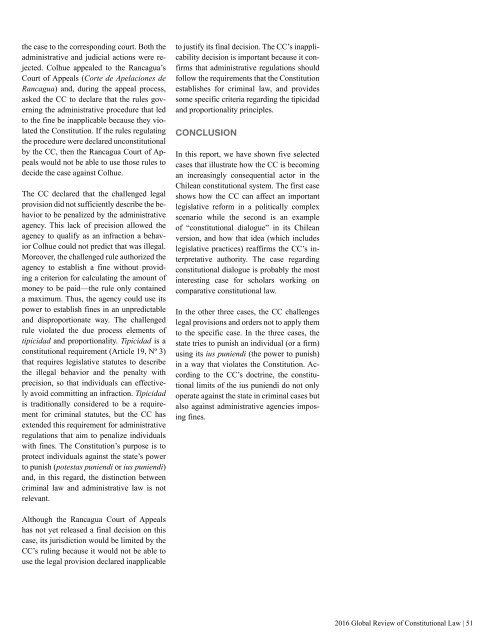2016 Global Review of Constitutional Law
I-CONnect–Clough Center collaboration.
I-CONnect–Clough Center collaboration.
Create successful ePaper yourself
Turn your PDF publications into a flip-book with our unique Google optimized e-Paper software.
the case to the corresponding court. Both the<br />
administrative and judicial actions were rejected.<br />
Colhue appealed to the Rancagua’s<br />
Court <strong>of</strong> Appeals (Corte de Apelaciones de<br />
Rancagua) and, during the appeal process,<br />
asked the CC to declare that the rules governing<br />
the administrative procedure that led<br />
to the fine be inapplicable because they violated<br />
the Constitution. If the rules regulating<br />
the procedure were declared unconstitutional<br />
by the CC, then the Rancagua Court <strong>of</strong> Appeals<br />
would not be able to use those rules to<br />
decide the case against Colhue.<br />
The CC declared that the challenged legal<br />
provision did not sufficiently describe the behavior<br />
to be penalized by the administrative<br />
agency. This lack <strong>of</strong> precision allowed the<br />
agency to qualify as an infraction a behavior<br />
Colhue could not predict that was illegal.<br />
Moreover, the challenged rule authorized the<br />
agency to establish a fine without providing<br />
a criterion for calculating the amount <strong>of</strong><br />
money to be paid—the rule only contained<br />
a maximum. Thus, the agency could use its<br />
power to establish fines in an unpredictable<br />
and disproportionate way. The challenged<br />
rule violated the due process elements <strong>of</strong><br />
tipicidad and proportionality. Tipicidad is a<br />
constitutional requirement (Article 19, Nº 3)<br />
that requires legislative statutes to describe<br />
the illegal behavior and the penalty with<br />
precision, so that individuals can effectively<br />
avoid committing an infraction. Tipicidad<br />
is traditionally considered to be a requirement<br />
for criminal statutes, but the CC has<br />
extended this requirement for administrative<br />
regulations that aim to penalize individuals<br />
with fines. The Constitution’s purpose is to<br />
protect individuals against the state’s power<br />
to punish (potestas puniendi or ius puniendi)<br />
and, in this regard, the distinction between<br />
criminal law and administrative law is not<br />
relevant.<br />
to justify its final decision. The CC’s inapplicability<br />
decision is important because it confirms<br />
that administrative regulations should<br />
follow the requirements that the Constitution<br />
establishes for criminal law, and provides<br />
some specific criteria regarding the tipicidad<br />
and proportionality principles.<br />
CONCLUSION<br />
In this report, we have shown five selected<br />
cases that illustrate how the CC is becoming<br />
an increasingly consequential actor in the<br />
Chilean constitutional system. The first case<br />
shows how the CC can affect an important<br />
legislative reform in a politically complex<br />
scenario while the second is an example<br />
<strong>of</strong> “constitutional dialogue” in its Chilean<br />
version, and how that idea (which includes<br />
legislative practices) reaffirms the CC’s interpretative<br />
authority. The case regarding<br />
constitutional dialogue is probably the most<br />
interesting case for scholars working on<br />
comparative constitutional law.<br />
In the other three cases, the CC challenges<br />
legal provisions and orders not to apply them<br />
to the specific case. In the three cases, the<br />
state tries to punish an individual (or a firm)<br />
using its ius puniendi (the power to punish)<br />
in a way that violates the Constitution. According<br />
to the CC’s doctrine, the constitutional<br />
limits <strong>of</strong> the ius puniendi do not only<br />
operate against the state in criminal cases but<br />
also against administrative agencies imposing<br />
fines.<br />
Although the Rancagua Court <strong>of</strong> Appeals<br />
has not yet released a final decision on this<br />
case, its jurisdiction would be limited by the<br />
CC’s ruling because it would not be able to<br />
use the legal provision declared inapplicable<br />
<strong>2016</strong> <strong>Global</strong> <strong>Review</strong> <strong>of</strong> <strong>Constitutional</strong> <strong>Law</strong> | 51


